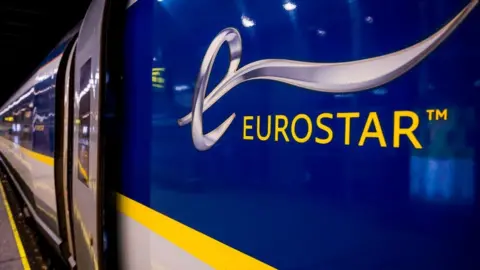Eurostar secures £250m rescue package
 Getty Images
Getty ImagesEurostar has managed to secure a £250m rescue package from banks and investors as it continues to battle a severe drop in demand due to the Covid-19 crisis.
The funding will help keep it afloat in the medium term, a spokesperson said.
The rail operator had warned in November that it was "fighting for survival", with its services scaled back dramatically amid the pandemic.
Eurostar plans to gradually run more trains should coronavirus restrictions ease as hoped.
It is currently only running one train per day between London St Pancras and Paris Gare du Nord, and one a day between Amsterdam and Brussels.
The £250m in funding consists of £50m equity from shareholders, £150m in new loans from banks that are guaranteed by shareholders, and £50m from restructured existing bank loans.
Eurostar chief executive Jacques Damas said the funding "will allow us to continue to provide this important service for passengers".
"The refinancing agreement is the key factor enabling us to increase our services as the situation with the pandemic starts to improve."
Mr Damas added that the coordinated action of governments in the UK and the EU was "crucial to the restoring of demand and the financial recovery of our business".
The operator said that over the past year it "has experienced a more severe decline in demand resulting from the global Covid-19 pandemic than any other European train operator or competitor airline."
Support call
Eurostar warned in November that it was "fighting for its survival against a 95% drop in demand".
It called for more support from the UK government after airports were given up to £8m in grants equivalent to business rates.
In January, it again called for UK government help, warning that there was "a real risk" to its survival.
But in February, Transport Secretary Grant Shapps said that while the government was "very keen for Eurostar to survive", he said "it's not our company" and its difficulties were "the shareholders' problem to resolve".
The UK government sold its stake in Eurostar in 2015.
Eurostar's majority shareholder is the French state railway group SNCF. Other shareholders include pension funds Caisse de dépôt et placement du Québec ("CDPQ") and Federated Hermes, and SNCB, the Belgian state train operator.
Recovery plans
Eurostar said that it would focus on restoring services on its core routes between London, Paris, Brussels and Amsterdam, and that it would maintain "rigorous cost control" to repay loans.
It said there was a "growing appetite" for high-speed rail travel from passengers in light of increasing awareness of climate change and the impact of air travel on the environment.
From 27 May, Eurostar will start running two daily return services on the London to Paris route, and three per day from the end of June "with a view to gradually increasing the frequency over the summer period as travel restrictions are eased".
At present, travellers from the UK must have an "essential reason" for visiting France, and need to take Covid tests and self isolate for seven days on arrival.
France is currently on the UK government's "amber list" for travel, meaning people from the UK need to quarantine for 10 days on their return.
